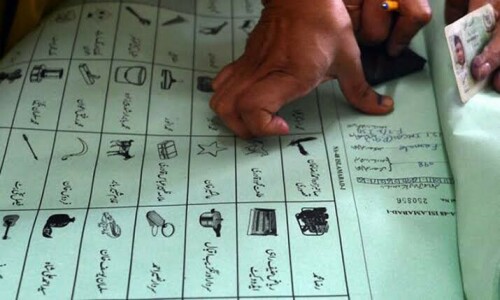ISLAMABAD: The army decided on Friday to continue ‘intelligence-based operations’ (IBOs) against militant targets throughout the country to pre-empt terrorist attacks.
The decision was taken at a meeting of Corps Commanders held at the General Headquarters under the chairmanship of Chief of the Army Staff Gen Raheel Sharif.
This was the first meeting since Gen Sharif returned from an extended trip to the United States, where he is reported to have pushed the case for rebuilding bilateral defence cooperation and bridging the trust gap caused by differences over counter-terrorism strategies.
A source, who attended the meeting, said there was a consensus on continuing the IBOs that were viewed as “highly effective” in preventing terrorist attacks.
A statement issued by the army’s public affairs division, ISPR, said: “Ongoing intelligence-based operations, which have led to the apprehension of a large number of terrorists hiding across the country, were reviewed.”
Although the concept of IBOs was originally given in the National Internal Security Policy unveiled earlier this year by the interior ministry, these were started after the Zarb-i-Azb military operation for forestalling the much-feared militant backlash, which had delayed the army’s action in North Waziristan for years.
So far over 3,000 IBOs have been carried out across the country in which a large number of hardcore terrorists have either been arrested or killed. But importantly there have been a few major terrorist attacks since these operations began.
The meeting also agreed to intensify the tracking of militant groups and dealing with them wherever the threat manifested itself, besides improving coordination between civilian and military intelligence agencies, the source said.
“Gen Raheel Sharif directed continuous evaluation of threat to be able to respond pre-emptively and effectively and an effective integration of efforts of all intelligence agencies to achieve optimum results against terrorists,” the ISPR said.
NEXT PHASES: The meeting discussed the next phases in the Zarb-i-Azb and Khyber operations.
The main axis in North Waziristan has been cleared during the operation started in the middle of June. The commanders are now planning for areas beyond Dattakhel towards the border with Afghanistan. They would most likely be moving towards forested Shawal Valley.
After the launch of Zarb-i-Azb, many terrorists had fled to Shawal Valley, Razmak and areas along Ghulam Khan Road. Sanctuaries in Shawal have already been targeted by PAF jets since September/October, but the battle for Shawal is likely to be tougher than the earlier phase.
The corps commanders were also briefed on the plan for return of the people displaced from North Waziristan and other agencies. The plan prepared by the military received prime minister’s approval when he was given a briefing on Tuesday.
“The strategy for return of temporary displaced persons (TDPs), including rehabilitation of North Waziristan and the rest of Fata was discussed in detail. The COAS underlined the need for preparation and integration of efforts with the federal and provincial governments for safe and dignified return of all TDPs to their homes at priority,” the ISPR said.
AFGHANISTAN: Gen Sharif directed immediate implementation of the security steps agreed with Afghanistan.
The measures include establishing an effective border control mechanism, improving liaison between military commanders on border incidents and ending cross-border attacks.
Relations between the two countries have improved since the installation of Ghani administration in Kabul. Gen Sharif had met President Ashraf Ghani when he visited Kabul in the first week of November and when the latter (Ghani) visited Islamabad he made an unprecedented trip to the GHQ for a meeting with the army chief. At the meeting, President Ghani had pledged stronger defence and security ties with Pakistan.
Published in Dawn, December 13th, 2014















































Dear visitor, the comments section is undergoing an overhaul and will return soon.